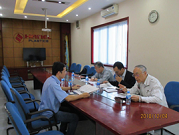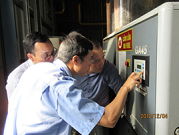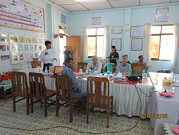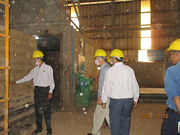Supervision of on-site Energy Conservation practical testing for qualified energy manager leader training projects in Vietnam and Myanmar
<Dispatch of Experts>
Under the instruction and financial support of the Ministry of Economy, Trade and Industry (METI), the Energy Conservation Center, Japan (ECCJ) visited Vietnam on December 4, 2018 followed by a visit to Myanmar on December 6 to observe energy conservation practical testing in two locations as part of the Leader Training Project in the Qualified Energy Manager Training Program of the AJEEP Scheme 2 activities.
(1) Plastic factory (Vietnam): ECCJ observed the energy conservation audit of the boilers and air compressors and discussed the audit results.
(2) Brick factory (Myanmar): ECCJ observed the energy conservation audit of the brick firing process and discussed the audit results.

Meeting held in Vietnam

Air compressor investigation

Presentation given by the auditors in Myanmar

Brick surface temperature measurement
As the second part of the AJEEP Scheme 2 Qualified Energy Manager Training Program, energy conservation practical training was implemented in both Vietnam and Myanmar, and ECCJ participated in observing the practical training and discussing the results.
(1) On December 4, ECCJ observed an energy conservation audit at a Vietnamese plastic factory, where boiler wall temperature measurements were taken and energy conservation improvement proposals were made such as enhancing the internal thermal insulation. In the following one week period, it would continue to collect data of air leak investigations, gas analyses and others.
(2) On December 6, ECCJ observed an energy conservation audit at a Myanmar brick factory. The auditors had already completed energy conservation audits five times, proposed improvement measures including air leak prevention, and completed the audit report for the most part. However, the auditors were instructed to refer to the ECCJ energy conservation guidance before the training to be held in Japan.
* AJEEP: ASEAN–JAPAN Energy Efficiency Partnership
Program for building EE&C capacity in the ASEAN region by dispatching experts and implementing training in Japan

